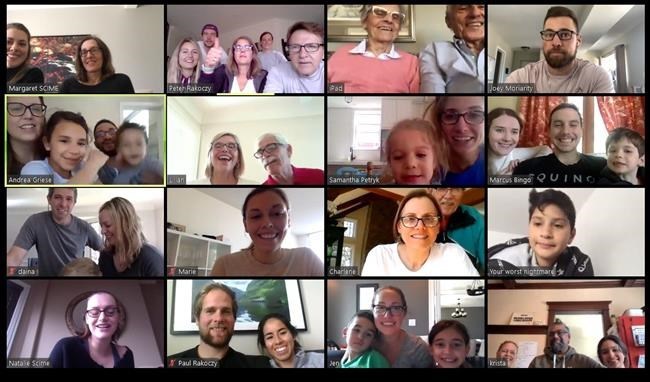It took a global pandemic to change Deb Scime's Easter plans.
Each year, about 50 relatives spanning four generations gather for a boisterous, pot luck brunch to celebrate a Christian holiday that has been an integral part of her family life since childhood.
But as physical distancing measures take hold across the country in a bid to curb the spread of COVID-19, Scime said she and her loved ones are adapting their festivities to suit the times. The clan will convene via Zoom, with participants logging in from British Columbia to Ontario to mark one of Christianity's most important holidays.
Scime said she's grateful for the technology that will allow a cherished tradition to carry on, saying the virtual format may even enhance the experience.
"Usually those of us that are involved in hosting or preparing food are wildly busy at times like this, so it might give us an opportunity to visit a little bit more and spend a bit more time interacting with each other versus trying to get a meal on the table," Scime said from her home in Burlington, Ont.
With gatherings banned and public health officials urging everyone to stay home, families, faith communities and congregations across Canada are finding ways to mark what are considered key religious and cultural events together — from a distance.
A new online survey conducted this week by the Angus Reid Institute found 25 per cent of respondents who identified as Christian, Jewish or Muslim planned to follow a religious service online. Nine per cent said they would pray with family or others over a video chat.
Another seven per cent of participants said they would use an app for prayer or meditation, and two per cent said they would talk to a religious leader on the phone.
More than a quarter of respondents, however, said they would pray on their own at home using a holy text or scripture.
The polling industry's professional body, the Marketing Research and Intelligence Association, says online surveys cannot be assigned a margin of error as they are not a random sample and therefore are not necessarily representative of the whole population.
In Montreal, the city's Roman Catholic archdiocese has set up a phone line for those wishing to speak with a priest, operating daily in the afternoons in both official languages.
Liturgies, masses and a vigil will be livestreamed during Holy Week, though the commemoration of the Last Supper did not include the customary foot-washing ceremony.
Worshippers can follow the traditional Way of the Cross procession remotely on Friday morning as it's broadcast on the archdiocese's YouTube page.
"Whatever we can do to reach out to others is absolutely important," Montreal Archbishop Christian Lepine said in a statement.
"Although we are asked to keep physical distance from one another, and public gathering places (including our churches) are closed for the most part, our hearts and our Church community remain radically open to faith, compassion and loving solidarity."
Rev. Nick Coates, minister at the Red Deer Lake United Church in Calgary, said Easter services will be pre-recorded and posted on Facebook and YouTube, just as the weekly Sunday services have been since the restrictions were put in place.
The minister and other staff members usually stick around online for a while after videos are posted, checking in with viewers to try as much as possible to recreate that feeling of togetherness, he said.
Coates said many of the church's members are struggling to feel the growing hope that Easter represents.
"They're so distracted by the stress and anxiety and struggle that this pandemic has brought, where they don't feel like we're moving towards a moment of celebration," he said.
Theological meanings aside, Easter is an important time of community and often sees people reuniting with friends they haven't seen in a long time, he said, which makes the current situation particularly difficult.
"As we try to salvage what Easter can be, and make the most of it, our main goal is to say, let's name all the stuff we're feeling right now. Let's not hide it. Let's not run away from it. Let's name that this sucks, this is really hard, and this is changing everything," he said.
"But even in those moments, let's remember those truths that Easter tells us — that the worst thing is not the last thing, that love is better than fear, that life does go on and we're not alone."
Easter services in the Archdiocese of Toronto are being livestreamed from a virtually empty cathedral where only a handful of priests are on-hand to say mass, said Cardinal Thomas Collins, archbishop of Toronto and a high-ranking member of the Roman Catholic Church.
The online prayers have been widely embraced and attracted participants as far away as Africa, but Collins said the inability to take communion to mark the resurrection of Jesus Christ represents a significant loss for practising Catholics.
"You can't do it virtually," he said. "Any sacrament is meant to be physical. Personal. Present. But it's the best we can do."
Collins also said the novel approach to Easter represents a time for more meaningful engagement with faith and the world at large.
"It's a time to grow in a deep understanding of what life is really about so that when we do come out of this, whenever it is, we'll cherish every day more than we did in the days of our distractions in the past."
This report by The Canadian Press was first published on April 10, 2020.
Michelle McQuigge and Paola Loriggio, The Canadian Press




